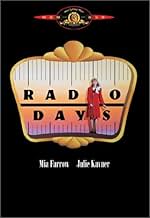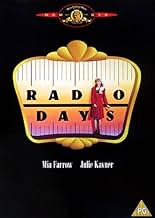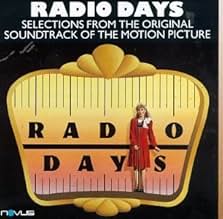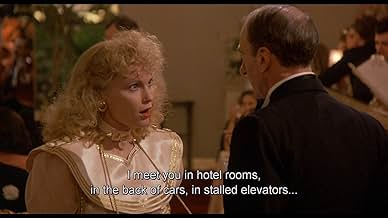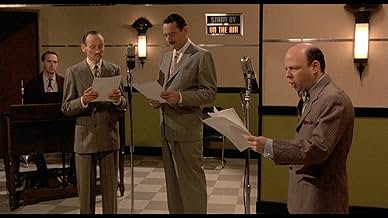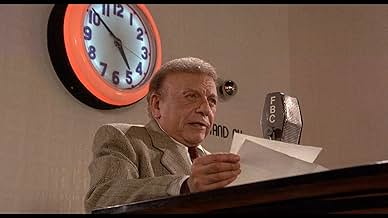CALIFICACIÓN DE IMDb
7.4/10
38 k
TU CALIFICACIÓN
Una mirada nostálgica a la edad de oro de la radio que se centra en una familia normal y los distintos artistas del medio.Una mirada nostálgica a la edad de oro de la radio que se centra en una familia normal y los distintos artistas del medio.Una mirada nostálgica a la edad de oro de la radio que se centra en una familia normal y los distintos artistas del medio.
- Dirección
- Guionista
- Elenco
- Nominado a 2 premios Óscar
- 3 premios ganados y 10 nominaciones en total
Mick Murray
- Avenger Crook
- (as Michael Murray)
Renée Lippin
- Ceil
- (as Renee Lippin)
- Dirección
- Guionista
- Todo el elenco y el equipo
- Producción, taquilla y más en IMDbPro
Opiniones destacadas
In my opinion, Radio Days is right up there with Annie Hall though it's different in that it's following several people's lives. Woody doesn't act in this, but his narration is excellent.
He takes the wonderful old songs and commercials from that time and weaves them into the story. I was completely captivated.
It's not a "laugh a minute" type film, but it also gets you thinking. Nevertheless, it has some hilarious scenes. Check out the Jewish fasting holiday scene. I've watched it at least 6 times and I still laugh. Also the scene with Mia Farrow's character was superb. One of my favorite lines is when she tells a top radio producer in her high-pitched nasal voice, "Jeez. We can't keep meeting like this. In the backs of cars, movie theaters and stalled elevators. You're gonna lose your respect for me!" I love this film.
He takes the wonderful old songs and commercials from that time and weaves them into the story. I was completely captivated.
It's not a "laugh a minute" type film, but it also gets you thinking. Nevertheless, it has some hilarious scenes. Check out the Jewish fasting holiday scene. I've watched it at least 6 times and I still laugh. Also the scene with Mia Farrow's character was superb. One of my favorite lines is when she tells a top radio producer in her high-pitched nasal voice, "Jeez. We can't keep meeting like this. In the backs of cars, movie theaters and stalled elevators. You're gonna lose your respect for me!" I love this film.
If you are looking for the normal amount of big laughs from a Woody Allen film, then you will be disappointed here. It's not that kind of film.
I was anything but disappointed, but I knew what the film was all about before I saw it. Actually, what drew me to it was that I had read where this was a wonderful visual film, filled with rich colors and great set designs. It did not let me down. This is a great visual tribute to the 1940s, to be exact from 1938 to 1944. A real treat for the eyes.
The story centers around a Jewish family in Queens and the importance that radio shows had in that day-and-age. Also profiled in here are some of those radio performers.
It does have laughs but not as many as the normal Allen movie because the idea of this is simply to be a nostalgic piece, mainly Allen's tribute to his own family days of growing up, what it was like around his house.
It was interesting to see Seth Green playing Woody as a youngster with flaming red hair. The most interesting person, however, was Diane Wiest who played a man-chasing sister-in-law. The film gives you a real flavor of the period, of New York and of a Jewish family.
Overall, it's simply a nice film....and gorgeous to look at. Sometimes I think some of Allen's work is overrated but, boy, here is one that is definitely underrated.
I was anything but disappointed, but I knew what the film was all about before I saw it. Actually, what drew me to it was that I had read where this was a wonderful visual film, filled with rich colors and great set designs. It did not let me down. This is a great visual tribute to the 1940s, to be exact from 1938 to 1944. A real treat for the eyes.
The story centers around a Jewish family in Queens and the importance that radio shows had in that day-and-age. Also profiled in here are some of those radio performers.
It does have laughs but not as many as the normal Allen movie because the idea of this is simply to be a nostalgic piece, mainly Allen's tribute to his own family days of growing up, what it was like around his house.
It was interesting to see Seth Green playing Woody as a youngster with flaming red hair. The most interesting person, however, was Diane Wiest who played a man-chasing sister-in-law. The film gives you a real flavor of the period, of New York and of a Jewish family.
Overall, it's simply a nice film....and gorgeous to look at. Sometimes I think some of Allen's work is overrated but, boy, here is one that is definitely underrated.
RADIO DAYS is one of Woody Allen's most underrated comedies, a fond look back to the days of radio and its effects on his family.
Set against long-forgotten radio programs, hit songs, and the coming of World War II, we get two narrative threads. The Rockaway family dealing with everyday issues in a series of vignettes, and the fictional life of Sally White (Mia Farrow) as she rises from cigarette girl to glittering radio star.
The cast is excellent. Farrow has a solid role as the Brooklyn girl with the Judy Holliday voice who battles her way toward upward mobility. Julie Kavner and Michael Tucker are terrific as the parents. Dianne Wiest is sweet as Aunt Bea, always on the lookout for true love. Seth Green plays Woody as a kid. Diane Keaton and Kitty Carlisle show up as singers. Josh Mostel and Renee Lippin are hilarious as the aunt and uncle. Wallace Shawn has a funny bit as the "Masked Avenger." Other notables include Richard Portnow as Si, Kenneth Mars as the rabbi, Larry David as the crazed neighbor, Jeff Daniels and William H. Macy as radio actors, Tony Roberts as the game show host, Danny Aiello as the gangster, and a special kudo for the hilarious Gina DeAngelis as his mother.
Highlights include Bea's date on the night of Orson Welles' famous radio program about a Martian invasion, and the poignant episode about the live radio coverage of a girl who's fallen down a well. The film also takes nostalgic looks at radio serials, quiz programs, and comedy shows.
The film perfectly captures the middle class neighborhood of Allen's youth. The interiors are beautifully done (Santo Loquasto), and very memorable is the awe-inspiring visit to Radio City Music Hall with its dimmed lights, lush carpets, and warm red-and-gold tones.
There is also a parade oh hit songs of the day that include "September Song," "Tico Tico," "Mairzy Doats," "South American Way," "Pistol Packin' Mama," "If I Didn't Care," and so many others.
A final word for the many actors and actresses in small parts who make this movie feel so right. Many have walk-ons or have only a line or two but they add the perfect touch and help recreate Woody Allen's beloved New York City.
Set against long-forgotten radio programs, hit songs, and the coming of World War II, we get two narrative threads. The Rockaway family dealing with everyday issues in a series of vignettes, and the fictional life of Sally White (Mia Farrow) as she rises from cigarette girl to glittering radio star.
The cast is excellent. Farrow has a solid role as the Brooklyn girl with the Judy Holliday voice who battles her way toward upward mobility. Julie Kavner and Michael Tucker are terrific as the parents. Dianne Wiest is sweet as Aunt Bea, always on the lookout for true love. Seth Green plays Woody as a kid. Diane Keaton and Kitty Carlisle show up as singers. Josh Mostel and Renee Lippin are hilarious as the aunt and uncle. Wallace Shawn has a funny bit as the "Masked Avenger." Other notables include Richard Portnow as Si, Kenneth Mars as the rabbi, Larry David as the crazed neighbor, Jeff Daniels and William H. Macy as radio actors, Tony Roberts as the game show host, Danny Aiello as the gangster, and a special kudo for the hilarious Gina DeAngelis as his mother.
Highlights include Bea's date on the night of Orson Welles' famous radio program about a Martian invasion, and the poignant episode about the live radio coverage of a girl who's fallen down a well. The film also takes nostalgic looks at radio serials, quiz programs, and comedy shows.
The film perfectly captures the middle class neighborhood of Allen's youth. The interiors are beautifully done (Santo Loquasto), and very memorable is the awe-inspiring visit to Radio City Music Hall with its dimmed lights, lush carpets, and warm red-and-gold tones.
There is also a parade oh hit songs of the day that include "September Song," "Tico Tico," "Mairzy Doats," "South American Way," "Pistol Packin' Mama," "If I Didn't Care," and so many others.
A final word for the many actors and actresses in small parts who make this movie feel so right. Many have walk-ons or have only a line or two but they add the perfect touch and help recreate Woody Allen's beloved New York City.
This movie starts with two burglars answering the phone during a break-in. They win the radio contest and the next day, the homeowners are shocked by the arrival of the winnings after finding their home robbed. Woody Allen narrates this nostalgic recollection of vignettes during his childhood. Joe (Seth Green) lives in Rockaway Beach with his parents Tess (Julie Kavner) and Martin (Michael Tucker) as well as an extended family. His imagination and his memories deliver stories about the people in his life and the radio they listen to. There is the War of the Worlds broadcast. Joe's favorite character is the Masked Avenger. There are also stories about the radio peronalities and aspiring actress cigarette-girl Sally White (Mia Farrow).
Woody delivers a loving tribute to the concept of radio through the eyes of childhood. This has a large cast with wide ranging vignettes. It's imaginative, touching, and fun. The characters are specific and compelling. There is a terrific veneer of memory. Through all the surreal and the real, there is the love of family and radio that transcends the screen onto the audience.
Woody delivers a loving tribute to the concept of radio through the eyes of childhood. This has a large cast with wide ranging vignettes. It's imaginative, touching, and fun. The characters are specific and compelling. There is a terrific veneer of memory. Through all the surreal and the real, there is the love of family and radio that transcends the screen onto the audience.
10bbbaldie
This movie shouts one word: WARMTH. The colors, the plot, the characters, they are all wonderfully warm.
I've watched this movie with senior citizens who were around in the forties. I once watched it with a Jewish guy who grew up on Long Island (albeit in the early 30's, not the 40's). All comments were the same: THIS was life in New York during wartime.
Vietnam was my war, so this era was a mystery to me. However, any time a genius like Woody Allen can create a film that not only makes me and my rowdy friends laugh, but gets guffaws from my dear old Mom as well, it deserves a little fanfare.
I didn't even mention the solid gold music.
See this film at once!
I've watched this movie with senior citizens who were around in the forties. I once watched it with a Jewish guy who grew up on Long Island (albeit in the early 30's, not the 40's). All comments were the same: THIS was life in New York during wartime.
Vietnam was my war, so this era was a mystery to me. However, any time a genius like Woody Allen can create a film that not only makes me and my rowdy friends laugh, but gets guffaws from my dear old Mom as well, it deserves a little fanfare.
I didn't even mention the solid gold music.
See this film at once!
¿Sabías que…?
- TriviaThe story of Kirby Kyle, the ill-fated baseball player, is a parody of former Chicago White Sox pitcher Monty Stratton, whose promising career was derailed after he lost part of his leg due to a hunting accident. Stratton attempted a comeback and then retired. His life was made into a movie: Retorna el campeón (1949).
- ErroresIn one scene, a pack of Camel cigarettes lies on a table, with a clearly visible bar code on the side of the package. The Universal Product Code would not be introduced until the 1970s.
- Citas
[Last lines]
Narrator: I never forgot that New Year's Eve when Aunt Bea awakened me to watch 1944 come in. I've never forgotten any of those people or any of the voices we would hear on the radio. Though the truth is, with the passing of each New Year's Eve, those voices do seem to grow dimmer and dimmer.
- Bandas sonorasThe Flight of the Bumblebee
(1899-1900)
Music by Nikolai Rimsky-Korsakov
Performed by Harry James
Courtesy of CBS Records
Played during the opening credits
Selecciones populares
Inicia sesión para calificar y agrega a la lista de videos para obtener recomendaciones personalizadas
Detalles
- Fecha de lanzamiento
- País de origen
- Sitio oficial
- Idiomas
- También se conoce como
- Radio Days
- Locaciones de filmación
- Radio City Music Hall - 1260 6th Avenue, Rockefeller Center, Manhattan, Nueva York, Nueva York, Estados Unidos(Joe, his Aunt Bea and her date see a movie there)
- Productoras
- Ver más créditos de la compañía en IMDbPro
Taquilla
- Presupuesto
- USD 16,000,000 (estimado)
- Total en EE. UU. y Canadá
- USD 14,792,779
- Fin de semana de estreno en EE. UU. y Canadá
- USD 1,522,423
- 1 feb 1987
- Total a nivel mundial
- USD 14,792,779
Contribuir a esta página
Sugiere una edición o agrega el contenido que falta

Principales brechas de datos
By what name was Días de radio (1987) officially released in India in English?
Responda


